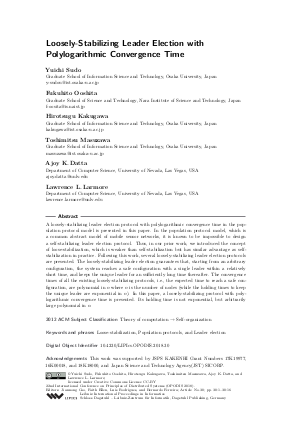Loosely-Stabilizing Leader Election with Polylogarithmic Convergence Time
Authors Yuichi Sudo, Fukuhito Ooshita, Hirotsugu Kakugawa, Toshimitsu Masuzawa, Ajoy K. Datta, Lawrence L. Larmore
-
Part of:
Volume:
22nd International Conference on Principles of Distributed Systems (OPODIS 2018)
Part of: Series: Leibniz International Proceedings in Informatics (LIPIcs)
Part of: Conference: International Conference on Principles of Distributed Systems (OPODIS) - License:
 Creative Commons Attribution 3.0 Unported license
Creative Commons Attribution 3.0 Unported license
- Publication Date: 2019-01-15
File

PDF
LIPIcs.OPODIS.2018.30.pdf
- Filesize: 0.55 MB
- 16 pages
Document Identifiers
Subject Classification
ACM Subject Classification
- Theory of computation → Self-organization
Keywords
- Loose-stabilization
- Population protocols
- and Leader election
Metrics
- Access Statistics
-
Total Accesses (updated on a weekly basis)
0PDF Downloads0Metadata Views
Abstract
A loosely-stabilizing leader election protocol with polylogarithmic convergence time in the population protocol model is presented in this paper. In the population protocol model, which is a common abstract model of mobile sensor networks, it is known to be impossible to design a self-stabilizing leader election protocol. Thus, in our prior work, we introduced the concept of loose-stabilization, which is weaker than self-stabilization but has similar advantage as self-stabilization in practice. Following this work, several loosely-stabilizing leader election protocols are presented. The loosely-stabilizing leader election guarantees that, starting from an arbitrary configuration, the system reaches a safe configuration with a single leader within a relatively short time, and keeps the unique leader for an sufficiently long time thereafter. The convergence times of all the existing loosely-stabilizing protocols, i.e., the expected time to reach a safe configuration, are polynomial in n where n is the number of nodes (while the holding times to keep the unique leader are exponential in n). In this paper, a loosely-stabilizing protocol with polylogarithmic convergence time is presented. Its holding time is not exponential, but arbitrarily large polynomial in n.
Cite As Get BibTex
Yuichi Sudo, Fukuhito Ooshita, Hirotsugu Kakugawa, Toshimitsu Masuzawa, Ajoy K. Datta, and Lawrence L. Larmore. Loosely-Stabilizing Leader Election with Polylogarithmic Convergence Time. In 22nd International Conference on Principles of Distributed Systems (OPODIS 2018). Leibniz International Proceedings in Informatics (LIPIcs), Volume 125, pp. 30:1-30:16, Schloss Dagstuhl – Leibniz-Zentrum für Informatik (2019)
https://doi.org/10.4230/LIPIcs.OPODIS.2018.30
BibTex
@InProceedings{sudo_et_al:LIPIcs.OPODIS.2018.30,
author = {Sudo, Yuichi and Ooshita, Fukuhito and Kakugawa, Hirotsugu and Masuzawa, Toshimitsu and Datta, Ajoy K. and Larmore, Lawrence L.},
title = {{Loosely-Stabilizing Leader Election with Polylogarithmic Convergence Time}},
booktitle = {22nd International Conference on Principles of Distributed Systems (OPODIS 2018)},
pages = {30:1--30:16},
series = {Leibniz International Proceedings in Informatics (LIPIcs)},
ISBN = {978-3-95977-098-9},
ISSN = {1868-8969},
year = {2019},
volume = {125},
editor = {Cao, Jiannong and Ellen, Faith and Rodrigues, Luis and Ferreira, Bernardo},
publisher = {Schloss Dagstuhl -- Leibniz-Zentrum f{\"u}r Informatik},
address = {Dagstuhl, Germany},
URL = {https://drops.dagstuhl.de/entities/document/10.4230/LIPIcs.OPODIS.2018.30},
URN = {urn:nbn:de:0030-drops-100901},
doi = {10.4230/LIPIcs.OPODIS.2018.30},
annote = {Keywords: Loose-stabilization, Population protocols, and Leader election}
}
Author Details
- Graduate School of Science and Technology, Nara Institute of Science and Technology, Japan
References
-
Dan Alistarh and Rati Gelashvili. Polylogarithmic-time leader election in population protocols. In Proceedings of the 42nd International Colloquium on Automata, Languages, and Programming, pages 479-491. Springer, 2015.

-
Dan Alistarh, Rati Gelashvili, and Milan Vojnović. Fast and exact majority in population protocols. In the 34th ACM Symposium on Principles of Distributed Computing, pages 47-56, 2015.

-
D. Angluin, J Aspnes, Z. Diamadi, M.J. Fischer, and R. Peralta. Computation in networks of passively mobile finite-state sensors. Distributed Computing, 18(4):235-253, 2006.

-
D. Angluin, J. Aspnes, M. J Fischer, and H. Jiang. Self-stabilizing population protocols. ACM Transactions on Autonomous and Adaptive Systems, 3(4):13, 2008.

-
Dana Angluin, James Aspnes, and David Eisenstat. Fast computation by population protocols with a leader. Distributed Computing, 21(3):183-199, 2008.

-
J. Beauquier, P. Blanchard, and J. Burman. Self-stabilizing leader election in population protocols over arbitrary communication graphs. In International Conference on Principles of Distributed Systems, pages 38-52, 2013.

-
S. Cai, T. Izumi, and K. Wada. How to prove impossibility under global fairness: On space complexity of self-stabilizing leader election on a population protocol model. Theory of Computing Systems, 50(3):433-445, 2012.

-
D. Canepa and M. G. Potop-Butucaru. Stabilizing leader election in population protocols, 2007. http://hal.inria.fr/inria-00166632.

- M. J. Fischer and H. Jiang. Self-stabilizing Leader Election in Networks of Finite-State Anonymous Agents. In International Conference on Principles of Distributed Systems, pages 395-409, 2006. URL: http://dx.doi.org/10.1007/11945529_28.
-
Leszek Gąsieniec and Grzegorz Staehowiak. Fast space optimal leader election in population protocols. In Proceedings of the Twenty-Ninth Annual ACM-SIAM Symposium on Discrete Algorithms, pages 2653-2667. SIAM, 2018.

-
T. Izumi. On Space and Time Complexity of Loosely-Stabilizing Leader Election. In International Colloquium on Structural Information and Communication Complexity, pages 299-312, 2015.

-
M. Mitzenmacher and E. Upfal. Probability and Computing: Randomized Algorithms and Probabilistic Analysis. Cambridge University Press, 2005.

-
R. Mizoguchi, H. Ono, S. Kijima, and M. Yamashita. On space complexity of self-stabilizing leader election in mediated population protocol. Distributed Computing, 25(6):451-460, 2012.

-
Y. Sudo, J. Nakamura, Y. Yamauchi, F. Ooshita, H. Kakugawa, and T. Masuzawa. Loosely-stabilizing leader election in a population protocol model. Theoretical Computer Science, 444:100-112, 2012.

-
Y. Sudo, F. Ooshita, H. Kakugawa, and T. Masuzawa. Loosely-Stabilizing Leader Election on Arbitrary Graphs in Population Protocols. In International Conference on Principles of Distributed Systems, pages 339-354, 2014.

-
Y. Sudo, F. Ooshita, H. Kakugawa, and T. Masuzawa. Loosely-stabilizing Leader Election on Arbitrary Graphs in Population Protocols without Identifiers nor Random Numbers. In International Conference on Principles of Distributed Systems, 2015.

-
Yuichi Sudo, Toshimitsu Masuzawa, Ajoy K Datta, and Lawrence L Larmore. The Same Speed Timer in Population Protocols. In the 36th IEEE International Conference on Distributed Computing Systems, pages 252-261, 2016.

-
X. Xu, Y. Yamauchi, S. Kijima, and M. Yamashita. Space Complexity of Self-Stabilizing Leader Election in Population Protocol Based on k-Interaction. In Symposium on Self-Stabilizing Systems, pages 86-97, 2013.

